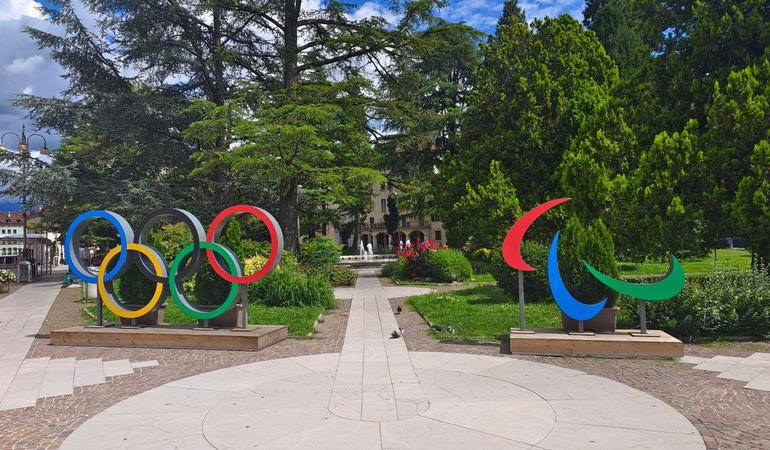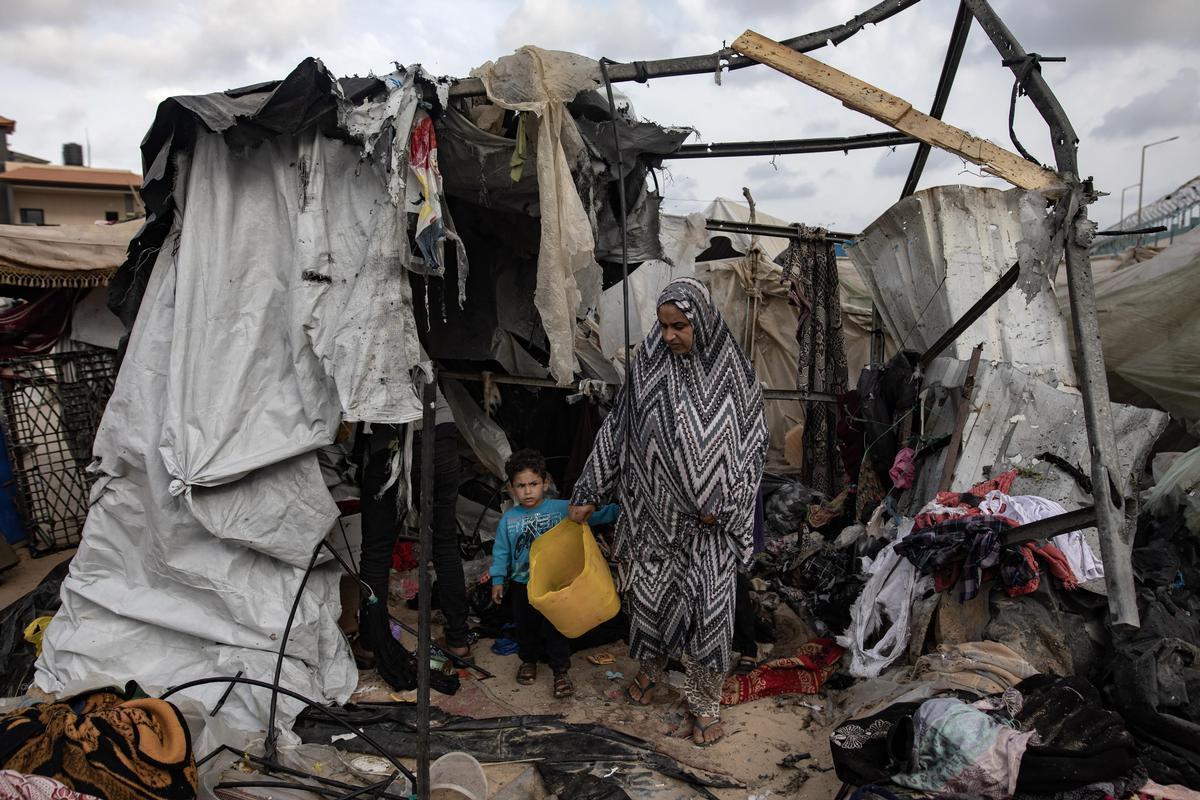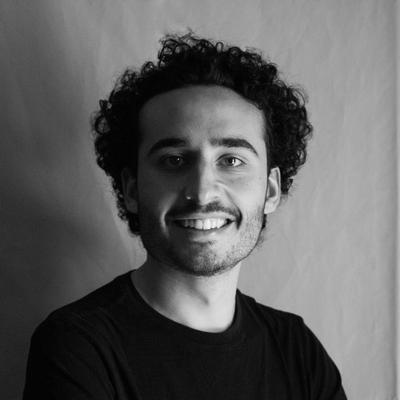
Milano-Cortina. Ecco come verranno spesi i 450 milioni di euro delle paralimpiadi



21 giugno 2024
"All eyes on Rafah". On Instagram, this inscription has been re-shared almost 50 million times: it invites people to keep a close eye on the war happening in the city in the extreme south of the Gaza Strip, on the border with Egypt, where for a month now Israeli air strikes have been joined by a ground invasion. While journalists are still denied access, the eyes on Rafah are those of humanitarian workers and civilians who entrust to social networks the story of their daily lives under the bombs. We spoke to some of them.
'There is no safe place in Gaza. They are destroying everything, killing women, children and the elderly in the most atrocious ways'Mohammed - 19 yrs old, student
Mohammed, 19, was studying communication at al Aqsa University in Khan Younis, 10 kilometres further north, before the war. The university was destroyed by Israeli shelling last January, and today dozens of displaced people find refuge in its ruins, as documented by the Turkish news agency Anadolu. "I dreamed of graduating, getting married, building a house and living there with my family," Mohammed writes in chat in the rare moments when the connection works. "Today the most I can dream of is some drinking water and food." In early May, when the Israeli air force dropped leaflets warning of the imminent invasion on Rafah, he left home with his family and took refuge in the Al Mawasi area, west of the city, with an uncle. 'I don't know if my house is still standing, all our neighbours left like us,' he says. 'Today Rafah is a ghost town'.
Israel designated Al Mawasi as a safe zone for civilians. In reality, it has not been spared from bombings: the last one, on 28 May, killed 21 people according to Palestinian officials. 'There is no safe place in Gaza,' Mohammed comments, 'They are destroying everything, killing women, children and the elderly in the most atrocious ways'. He tells of losing several acquaintances: family members, university friends and "the girl I loved".
In Al Mawasi, people are fed by humanitarian aid that manages to get through from Egypt, via the Rafah crossing, or from Israel, via the Kerem Shalom crossing. Both are controlled by Israeli forces, which decide how much and what can enter. According to the United Nations agency for Palestinian refugees (Unrwa), 350 trucks have been allowed in in recent weeks, when 600 a day would be needed to meet the needs of the population. "Each box contains four or five cans of beans or chickpeas, tinned meat, a packet of sweets,' Mohammed says. 'If we don't have enough we try to buy something, but it's hard to find and it all costs so much. For example, before the war a 25-kilo sack of flour cost about ten dollars, today 25. A packet of yeast cost three dollars, today three times as much, and the same goes for canned food, fruit and vegetables'.
10 yrs ago, the photoreporter Rocchelli was killed in Ukraine. His mother still seeks justice
Now Mohammed is trying to escape, again: 'It has become too dangerous: a few days ago a bomb fell on our neighbours. But we have no relatives elsewhere, not even a tent. We sleep in the street'. Like him, thousands of Palestinians are trying to leave Rafah: according to Unrwa, more than a million people have already fled, mainly to Khan Younis. Many come from the north of the Strip and have been living as displaced persons for months, forced to flee continuously by the advancing Israeli tanks.
Shereen, 23, an English teacher, has already left the city. Among the latest content posted on her Instagram profile is a video: walks on the beach, tables laden with typical dishes, the city skyline at sunset. Above, the Arabic inscription 'our life before the war' and a broken heart. "I'm from Rafah, but when the Israeli army started the offensive we were forced to move to Maghazi camp (in the centre of the Strip, ed)," she recounts in the chat. "But it is not safe here either. There is no safe place in Gaza'. On the 16th, shelling hit part of the camp, killing 10 children and five men, according to Amnesty. The conversation is interrupted by long pauses, even of several hours: 'The connection doesn't always work and to charge the phone I have to go outside and reach a specific location in the camp,' Shereen explains. "Staying here is difficult: we live in a four-by-four metre tent and there are six of us. The toilet is outside, shared with I don't know how many people. There is not enough food, water and basic necessities for everyone. We were told that people died because of this, or because they drank dirty water or bad food. Some were children".
Freedom of the press is increasingly threatened in Italy
According to the United Nations, 493 health workers and 270 aid workers have been killed in the Strip since 7 October
The health system in Rafah is also collapsing: according to the United Nations only three field hospitals remain active, while in the entire Strip only 14 out of 36 facilities are functioning. In the last week alone, Médecins Sans Frontières has been forced to close two facilities, a stabilisation centre in Tal as-Sultan and a clinic in Al Mawasi, both in the Rafah area. Martina Marchiò, the humanitarian organisation's medical coordinator, returned to Italy at the end of May after serving for a month and a half: 'Hospitals and clinics were bursting with patients,' she told lavialibera. Those who suffered injuries from the explosions and had to go urgently to the operating theatre, but also patients suffering from chronic diseases such as diabetes or cardiovascular diseases that have flared up again due to the lack of medicines and adequate treatment'. To these are added hundreds of civilians who flock to the hospitals simply to find shelter. There are no other places ready to receive them: due to the bombing, Unrwa was forced to evacuate and close all 36 shelters it was managing in the Rafah area.
Marchiò has served in other war scenarios. This one, however, "is different from all the others": "Never have I experienced as this time the feeling that there is no safe place for anyone, not even for us operators", he says. It also happened that the bombs fell very close to us". According to the United Nations, 493 health workers and 270 aid workers have been killed in the Strip since 7 October. And then 'the most total destruction: entire areas razed to the ground, you drive through and there is nothing left. It will take at least ten years for them to return to the way they were before'.
The number of people amputated as a result of the explosions is also unprecedented: 'I have never seen so many in my life,' says Marchiò. 'So many children have lost their legs or arms. They are alive, but their lives have changed forever'. According to Unrwa, an average of more than 10 limbs of children are amputated every day in the Strip, and it is estimated that the war will cause 12,000 new cases of disability, adding to the approximately 130,000 reported in the Strip before 7 October. A report published by the Palestinian humanitarian organisation Qader last April shows how these people are now doubly vulnerable due to the closure of specialised facilities, the difficulty of movement and the shortage of medicines and medical equipment such as prostheses, crutches and wheelchairs.
The report cites the testimony of Ali, a 21-year-old disabled man living in Khan Younis, who recounts the difficulty of facing several consecutive displacements in a wheelchair: 'After seeking refuge first in a hospital and then at university, I was forced to flee to Rafah. Fortunately, I found compassionate people who assisted me by pushing my wheelchair through the rubble and under the shelling and provided me with a tent. But the lack of blankets and the scarcity of food and medicine have aggravated my health problems. Even going to the toilet is a challenge for me".
Russian media in exile, the story of three journalists Putin does not want
Marchiò also remembers the festive moments when, on 6 May, Hamas announced that it was in favour of a proposed ceasefire agreement brokered by Egypt and Qatar: 'People poured into the streets, singing and dancing. The next morning, however, the evacuation orders arrived and everyone was plunged into utter despair'. Last Friday, US President Joe Biden presented another proposal, calling for a ceasefire, the release of hostages in exchange for the release of some Palestinian detainees, and the withdrawal of Israeli troops from the Strip, but Israeli Prime Minister Netanyahu has announced that he will not stop the offensive until Hamas is completely destroyed.
Martina Marchiò calls for Italy to play its part too: together with 17 other colleagues from Doctors Without Borders, on 28 May she signed a letter addressed to President Giorgia Meloni asking that she "take the lead in a concrete and ambitious humanitarian initiative" to reach a ceasefire, guarantee the protection of civilians and ensure adequate humanitarian assistance. 'What we have seen is difficult to accept,' it reads. 'Everything is missing in Gaza and people are dying from everything. Over one million civilians are at the end of their tether, while the most elementary principles of humanity and solidarity are totally trampled upon'. Marchiò looks with hope at the solidarity movement born on social networks around Rafah, but it is not enough: 'We citizens can continue to push and make noise, but the decisions that can move the situation come from above'.
La tua donazione ci servirà a mantenere il sito accessibile a tutti
Riformata. Così il governo vorrebbe la magistratura, ma l'obiettivo è solo limitarne il potere
La tua donazione ci servirà a mantenere il sito accessibile a tutti